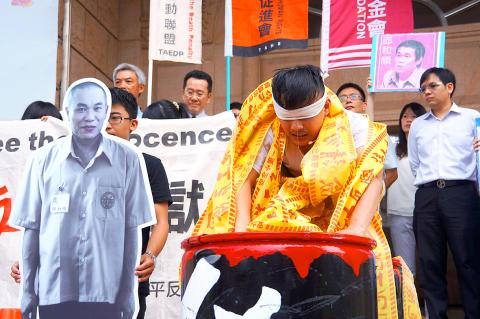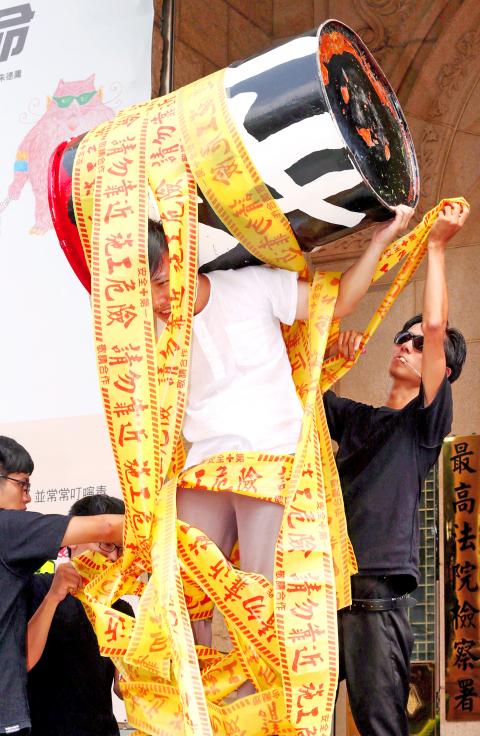Human rights and judicial reform advocates yesterday filed an extraordinary appeal for death row inmate Chiou Ho-shun (邱和順), who has been imprisoned for nearly 23 years after he was sentenced to death for two homicides in 1987.
They said the evidence against Chiou was questionable and Control Yuan investigations have found that he was tortured into confessing to the murders of a nine-year-old boy and an insurance agent.
As members of the Tsai Jui-yueh Dance Research Institute performed a piece outside the Supreme Court in Taipei about Chiou being tortured into confessing, rights advocates and attorneys filed an extraordinary appeal to Prosecutor-General Yen Ta-ho (顏大和).

Photo: Chien Li-chung, Taipei Times
They called on Yen to approve a new court review of Chiou’s case.
“We have filed numerous extraordinary appeals in the past years, but all were rejected by former prosecutor-general Huang Shi-ming (黃世銘),” Yu Po-hsiang (尤伯祥), one of Chiou’s attorneys, told reporters outside the courthouse. “We are filing a renewed extraordinary appeal today because an investigation report released by the Control Yuan last month found that there was torture behind Chiou’s confession. So we hope the new prosecutor-general will take a careful look at the case.”
Wellington Koo (顧立雄), another of Chiou’s attorneys, said that 10 police officers and two prosecutors were impeached by the Control Yuan or found guilty of “threatening and forcing Chiou into confession,” so it is clear that Chiou was tortured.

Photo: CNA
Yen should approve the appeal for a re-examination of the case, Koo said.
Wu Ching-chin (吳景欽), an associate law professor at Aletheia University, said that he has assigned the Chiou case to his students — without using Chiou’s name — and asked them to deliver a verdict, but “none rule that he is guilty because there is not sufficient evidence to support such verdict.”
Chiou is the longest-serving death row prisoner in Taiwan, Wu said.
“I hope Chiou will not become the next Iwao Hakamada,” the professor said, referring to a man in Japan who was convicted of manslaughter and sentenced to death, but declared not guilty and released from prison in March after 48 years on death row.
“The Hakamada case was overturned because one of the judges who had sentenced him to death had believed from the beginning that he was innocent, although he had given into peer pressure to find him guilty, and in 2007 he stood up to defend Hakamada,” Wu said. “One of the saddest things about the judiciary in Taiwan is that there is no judge who is willing to challenge the defects in the system. No one has such moral courage.”
The Supreme Court ruled on July 28, 2011, that Chiou had received a fair trial from the Taiwan High Court and deserved to die for the 1987 slaying of Lu Cheng (陸正), who was kidnapped and killed, and his dismembered body was reportedly disposed of in the ocean off Hsinchu County.
Prior to that decision, the Supreme Court had refused to confirm the High Court ruling 11 times, citing flaws in the process and sending the case back to the lower court for retrial.
Chiou’s girlfriend, Wu Shu-chen (吳淑貞), and Lin Kun-ming (林坤明) were also found guilty in connection with Lu’s murder and sentenced to 10 and 17 years respectively.
Additional reporting by staff writer

Alain Robert, known as the "French Spider-Man," praised Alex Honnold as exceptionally well-prepared after the US climber completed a free solo ascent of Taipei 101 yesterday. Robert said Honnold's ascent of the 508m-tall skyscraper in just more than one-and-a-half hours without using safety ropes or equipment was a remarkable achievement. "This is my life," he said in an interview conducted in French, adding that he liked the feeling of being "on the edge of danger." The 63-year-old Frenchman climbed Taipei 101 using ropes in December 2004, taking about four hours to reach the top. On a one-to-10 scale of difficulty, Robert said Taipei 101

Nipah virus infection is to be officially listed as a category 5 notifiable infectious disease in Taiwan in March, while clinical treatment guidelines are being formulated, the Centers for Disease Control (CDC) said yesterday. With Nipah infections being reported in other countries and considering its relatively high fatality rate, the centers on Jan. 16 announced that it would be listed as a notifiable infectious disease to bolster the nation’s systematic early warning system and increase public awareness, the CDC said. Bangladesh reported four fatal cases last year in separate districts, with three linked to raw date palm sap consumption, CDC Epidemic Intelligence

Taiwanese and US defense groups are collaborating to introduce deployable, semi-autonomous manufacturing systems for drones and components in a boost to the nation’s supply chain resilience. Taiwan’s G-Tech Optroelectronics Corp subsidiary GTOC and the US’ Aerkomm Inc on Friday announced an agreement with fellow US-based Firestorm Lab to adopt the latter’s xCell, a technology featuring 3D printers fitted in 6.1m container units. The systems enable aerial platforms and parts to be produced in high volumes from dispersed nodes capable of rapid redeployment, to minimize the risk of enemy strikes and to meet field requirements, they said. Firestorm chief technology officer Ian Muceus said

MORE FALL: An investigation into one of Xi’s key cronies, part of a broader ‘anti-corruption’ drive, indicates that he might have a deep distrust in the military, an expert said China’s latest military purge underscores systemic risks in its shift from collective leadership to sole rule under Chinese President Xi Jinping (習近平), and could disrupt its chain of command and military capabilities, a national security official said yesterday. If decisionmaking within the Chinese Communist Party has become “irrational” under one-man rule, the Taiwan Strait and the regional situation must be approached with extreme caution, given unforeseen risks, they added. The anonymous official made the remarks as China’s Central Military Commission Vice Chairman Zhang Youxia (張又俠) and Joint Staff Department Chief of Staff Liu Zhenli (劉振立) were reportedly being investigated for suspected “serious